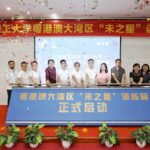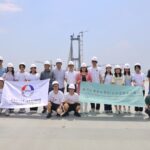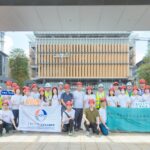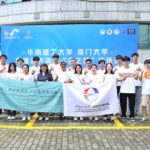 The opening ceremony of the training camp
The opening ceremony of the training camp
Students and faculty members from the Department of Civil and Environmental Engineering of the Faculty of Science and Technology at the University of Macau (UM) visited the School of Civil Engineering and Transportation at the South China University of Technology (SCUT) for a 10-day training camp, with the aim of broadening their professional horizons and improving their competitiveness.
The training camp was an important outcome of the cooperation agreement signed by UM and SCUT. It aimed to enhance exchanges and cooperation in civil engineering education, research, and talent development, and to strengthen links between higher education institutions in the Guangdong-Hong Kong-Macao Greater Bay Area. It incorporated both the inquiry-based learning approach and study tour and covered six modules, namely theoretical study, red education, cultural literacy, social practice, exchange and discussion, and skills training.
Students and faculty members from both universities visited the State Key Laboratory of Subtropical Building Science, 3D printing equipment for construction, and computed tomography (CT) detectors. They also attended lectures by SCUT professors and industry representatives to enhance their theoretical knowledge. Moreover, they visited the Memorial Hall of the Third National Congress of the Communist Party of China to gain a deeper understanding of the history of the Chinese Revolution and strengthen their patriotism. They also visited the Guangzhou Urban Planning Exhibition Center, the Pearl River, and the Canton Tower to explore Guangzhou’s history, culture and local customs.
In addition, participants from both universities visited several leading enterprises in China, such as China Construction Fourth Engineering Division Corp Ltd, China Railway Guangzhou Engineering Group Co Ltd, Guangdong Poly Real Estate Development Co Ltd, and Poly Changda Engineering Co Ltd, to learn more about their ongoing construction projects. They also examined the cooperation platforms between Guangdong, Hong Kong and Macao and their cases, such as the Nansha Guangdong-Hong Kong-Macao (International) Youth Entrepreneur Hub, and Hua Yun Tong Da that is applied to the roads in Macao, to gain insights into the development plan and prospects of the Greater Bay Area.
To strengthen exchanges and cooperation between young people from Guangdong and Macao, students from both universities took part in a knowledge competition as part of the exchange and discussion and skills training modules. The competition covered topics including the history, culture, economy, and development of the Greater Bay Area, with the aim of deepening students’ understanding of the Greater Bay Area and fostering mutual understanding and friendship between students from both universities. The students also presented and evaluated their learning outcomes from the training camp and shared their gains and reflections.
Seizing the opportunity of the development of the Greater Bay Area, UM and SCUT signed an agreement on the launch of a ‘2+2’ joint undergraduate programme in 2019. The training camp not only allowed UM students who will enrol in the joint programme to experience university life at SCUT in advance, but also allowed participants to familiarise themselves with the joint programme, playing a positive role in strengthening ties and fostering future cooperation between the two universities. The training camp was led by Lam Chi Chiu, assistant dean of the Faculty of Science and Technology, with the participation of Assistant Professor Pan Mi in the Department of Civil and Environmental Engineering, Research Assistant Professor Wong Mun On, and Senior Instructor Wan Iat Meng.





